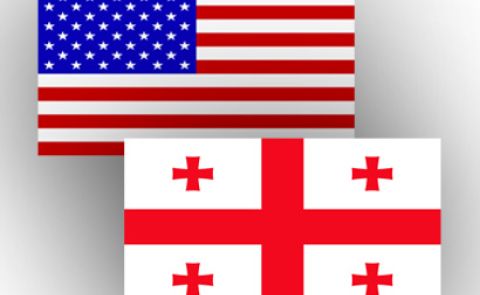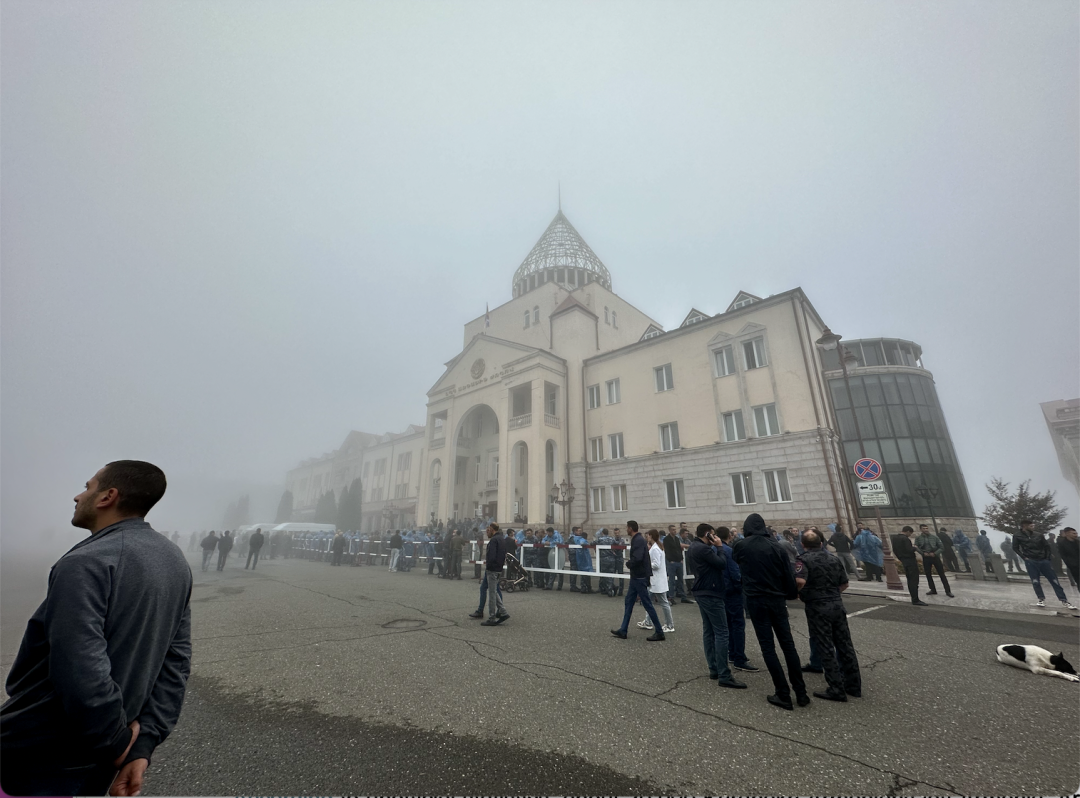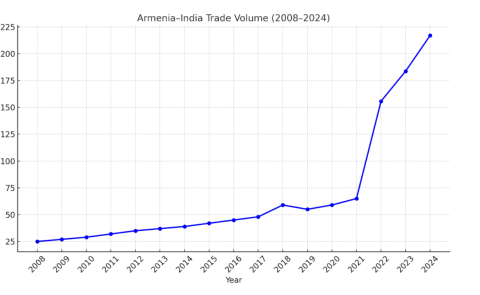
Abandoned to Their Fate: The Dim Future of Karabakh Armenians

“We have decided to leave for Russia. It is not possible to live here in Armenia anymore. With the financial support that we received from the Armenian government, we paid the rent for the house; as a result, there is nothing left to survive here. We can't find a job; the employer is looking for a younger one. We understand that it’s not perfect in Russia either, but we have no choice,” says Anush Hayrapetyan, who was displaced from Nagorno-Karabakh in September of last year and ended up in Armenia.
After the First Karabakh War in the early 1990s, many Karabakh Armenians left for Russia and didn’t return, although the past 30 years have been relatively peaceful there. During this period, many succeeded in Russia, built a house, and got citizenship; so to speak, a Karabakh Armenian "diaspora" formed in Russia. Thus, many, like Anush, prefer to go to Russia with their relatives rather than live in Armenia.
What forces Karabakh Armenians to leave Armenia? There are various reasons for it, and perhaps the main one is their socio-psychological condition. Everyone wants to return home to Nagorno-Karabakh, but at the same time, no one imagines living there under the Azerbaijani flag.According to unofficial statistics, about 20,000 Karabakh Armenians left Armenia. Artak Beglaryan, the former state minister of Artsakh, announced that about 10,000 Karabakh Armenians had left Armenia. The National Security Service of Armenia reports that 6,433 Nagorno-Karabakh Armenians left Armenia between September 19, 2023, and January 16, 2024. On April 5, during the Pashinyan-Blinken-von der Leyen meeting in Brussels, the EU and the U.S. expressed their readiness to provide financial support to Armenia in order to solve the problems of Karabakh Armenians. “We are not forgetting about the plight of the displaced Karabakh Armenians. The humanitarian situation of refugees in Armenia remains a priority. We have provided over 30 million euros in support of refugees since last September, and we are ready to do more to support the long-term integration of refugees,” announced Ursula von der Leyen.
“We will continue to support 100.000 ethnic Armenians displaced from Nagorno-Karabakh. This is central to Armenia’s long-term stability and prosperity, as well as its regional security. And we are supporting efforts to integrate people into the economy and into society, including via access to housing, jobs, and education,” said Antony Blinken.“First of all, they promised to give that money within 4 years. Of course, as a Karabakh Armenian, I am grateful to the EU and the U.S.; for so long, we have only received humanitarian support from them; others have not given us a single coin, but unfortunately, this will not solve the problems of Karabakh Armenians. Although we are all Armenians, we face integration problems here in Armenia. But what could we do - stay in Karabakh and die? In Krasnodar, prices for rent are three times cheaper than in Armenia; that’s why we leave,” says Babken Aghajanyan.
Six months after the displacement, the Karabakh Armenians are still unable to resolve the contradictions related to their legal status. It is unclear whether the Armenian government considers Karabakh Armenians with Republic of Armenia passports to be Armenian citizens or not. Because of this unclear status, Karabakh Armenians face a variety of social problems. For example, a month after the displacement, the Armenian government actually acknowledged the pension history of the Karabakh people, and based on the seniority worked in Karabakh and the contributions made to the pension funds, Armenians have been paying since December 2023. However, the pension system does not accept the seniority of those who have reached retirement age after displacement. According to statistics, over the past years, the people of Karabakh have accumulated 16 billion drams, and still, no one knows where these funds are.
Moreover, the Karabakh Armenians cannot understand what their status is in Armenia, and they face various contradictions. Although they have the same blue passport as all Armenian citizens, the Armenian government forces them to get a refugee certificate, without which they cannot leave Armenia. They receive a plastic card bearing the "Temporary Protection (Refugee) Certificate" in a small font, making it challenging to read even with glasses. For this certificate, they register at passport offices in Armenia and stand in unbearable queues for months. The Armenian passports with the code 070, which the Karabakh Armenians possess, don't differ in any way from other Armenian passports, and only at the Armenian airport do they require a "temporary protection" certificate and not in any other country in the world.
“During the blockade, we stood in line at night for bread in Karabakh. The same is here just for this so-called refugee certificate. I recently returned from Russia. The Armenian checkpoint did not even take an interest in my refugee certificate. I said that the certificate is in the car; would you like me to show it? At the checkpoint, they said, "there is no need, pass by,” a Karabakh Armenian standing in line at the passport department in Abovyan told me.
Where Are the Authorities of Nagorno-Karabakh, and What Do They Want to Do?
“I want to make it clear to everyone that there is one government in Armenia, and it is sitting in this hall,” countered Pashinyan in response to Nagorno-Karabakh President Shahramanyan's desire to create a government in exile.The media occasionally features the Karabakh authorities, yet their presence remains unnoticed. In any case, the Karabakh representation in Yerevan doesn't answer phone calls. People who have lost everything (Karabakh Armenians) consider it pointless to turn to them for their pressing needs.
“What danger can the Artsakh (Karabakh) government present? To manipulate by saying that there is only one government in Armenia, and it is the government of Armenia, it simply doesn’t fit into any logic. Who said that the government of Artsakh (Karabakh) pretends to be Armenia's government? That’s why we call it the government in exile. I would say more: the Armenian government itself should be interested in preserving the remaining part of the Artsakh (Karabakh) statehood that we have in Armenia today. It doesn't apply to all structures, but preserving at least those that are critical to the statehood of Artsakh (Karabakh) is a priority. But here and there, the authorities of Armenia not only fail to contribute to their preservation, but on the contrary, declare them a threat to national security,” said Gegham Stepanyan, Karabakh Human Rights Defender (Ombudsman), in the interview with Step1.am.There have been various proposals for having a Karabakh government in exile. The Armenian Diaspora also made a similar proposal. Political analyst Manvel Sargsyan told the Caucasus Watch that the government in exile can expand its activities in another friendly country.
Following Azerbaijan's 2020 war against Nagorno-Karabakh, the self-dissolution of the Republic of Nagorno-Karabakh, and the subsequent exodus of the Armenian population, the issue of Armenia's security gained prominence. The Republic of Armenia's leadership adopted the concept of "legitimacy" as the foundation for security, removing from foreign policy any issues that extend beyond the borders of the former Soviet Armenia.
Armenia stated that it does not have the issue of Nagorno-Karabakh, as well as the issue of the collective return of Karabakh Armenians to their homes. The problem of the Karabakh people has been reduced exclusively to humanitarian issues. However, some have questioned the wisdom of safeguarding the rights of the Karabakh people in international institutions. The Armenian government considers the issue of integrating the forcibly resettled population into Armenian society a priority. It is believed that such a policy can provide the Republic of Armenia with international support for ensuring security.
It is clear that with this approach, any activity of the Artsakh (Karabakh Armenians) people themselves on the territory of Armenia, including the activity of the leadership of the Republic of Artsakh (Nagorno-Karabakh), is considered dangerous for the Republic of Armenia. Very often, any activity of the President and Parliament of Artsakh (Nagorno-Karabakh) is subject to sharp criticism. Considering the position of the Republic of Armenia, one could argue that the leadership of the Republic of Artsakh (Nagorno-Karabakh) can initiate activities to preserve its interests. In particular, a government in exile can expand its activities in another, friendly country.
“The President of Artsakh (Nagorno-Karabakh) has already asserted that his declaration on the self-dissolution of the Republic of Artsakh (Nagorno-Karabakh) was unlawful and motivated by the need to safeguard the population from impending genocide. In fact, the question of determining the status of Nagorno-Karabakh also remains open. Moreover, the international community does not consider the Artsakh (Nagorno-Karabakh) issue closed and supports the right of Artsakh (Karabakh) people to return to their homeland under international control,” Sargsyan tells the Caucasus Watch.
“Azerbaijan considers the Karabakh chapter closed. It seems that the political aspect of Nagorno-Karabakh has also disappeared from the Armenian authorities' vocabulary. Just their social needs. Nagorno-Karabakh is not only a physical territory but also people, and perhaps first the people themselves. What will their fate be? At the moment, at least the government of Armenia should create a community life for us so that we can preserve our traditions and dialect; if not, we will simply scatter throughout Armenia and the world, warns the former mayor of Hadrut,” Vahan Savadyan.
About author: Marut Vanyan is a freelance journalist from Nagorno-Karabakh, currently based in Abovyan, Armenia.
See Also


Armenia and India: Building New Bridges in Trade and Strategy

Between Tehran and Tel Aviv: Azerbaijan’s Neutrality Dilemma Amid Rising U.S.-Israel Tensions with Iran

From Neorealism to Neoliberalism: Armenia’s Strategic Pivot in Foreign Policy After the Nagorno-Karabakh Conflict

Georgia and Russia: New Turn in Bilateral Relations

